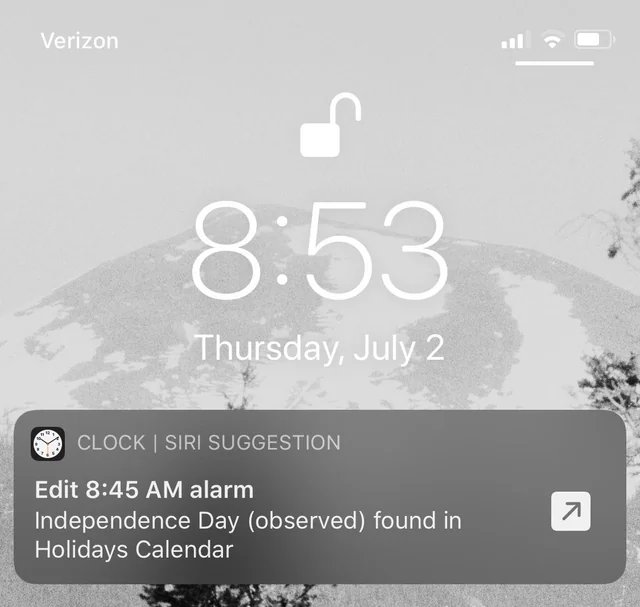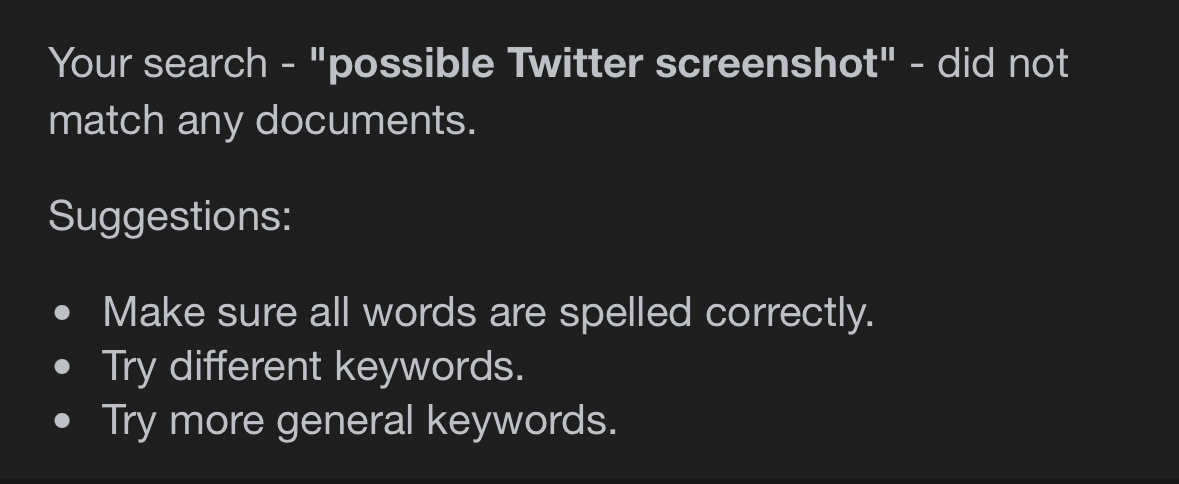Maybe the real artificial intelligence is the regular intelligence we found along the way.
NOOOOOOOO BRO
YOU GOTTA TRY THIS AI I PUT IN MY DIGITAL ALARM CLOCK
AI clock would be sweet.
Knows I slept through an alarm or forgot to set it and wakes me up or suggests the right time to set alarms based on traffic conditions
Reminded of one of the most welcome kind of message to pop up on my screen

Traff… Right, no public transport.
AI alarm cock.
That would be a lot like the computer on the spaceship in Red Dwarf, though.
Am I the only one that sees all of these AI platforms as just the next iteration of search engines?
They’re worse. They’re really the next generation of Cuil.
LLMs have been foundational to search engines going back to the 90s. Sam Altman is simply doing a clever job of marketing them as something new and magical
You’re thinking of Machine Learning and neural networks. The first “L” in LLM stands for “Large”; what’s new about these particular neural networks is the scale at which they operate. It’s like saying a modern APU from 2024 is equivalent to a Celeron from the early 90s; technically they’re in the same class, but one is much more complicated and powerful than the other.
You’re late lol. Phone assistants such as Siri, Bixby, Google Assistant etc. have already been AI search engines for years. People just didn’t really consider it until it got more advanced but it’s always been there.
Nah, I don’t feel like Bixby etc. fit that description. You couldn’t ask them how to fix certain problems or find websites relating to a topic the way you can LLMs. However, that would be a major use of search engines. For example, you would search “how to submit a tax report”, " how to install printer xy driver", or “videogame xy item”. All this bixby etc. are useless for.
Bixby etc. was more meant as a iteration of how to interact with phones in addition to touching.
Quantum mechanics builds up similar systems of logic.
“Correct question is half of answer”
What tech support department doesn’t have the “ask the stuffed bear on the counter in the corner out loud your question before asking tech support” system in place ?
I thought the canonical examen was a rubber duck.
Yes. Or an orb containing bouncing lasers on its unique internal surface containing geometrical matrix identities it can use to communicate advanced concepts to you in the form of energy. Check out how Dream plays Minecraft (or Minetest) right now. That’s still all based on cubic fractals that store energy, just like the Mandelbrot Set or a God, or even a God of gaps that can explain things and “spread enlightment through history”.
The future is all laser orbs and I think I can have a future with a loving God right now.
Ever watched Haruhi or Red Dwarf?
Is anyone who uses AI just an “AI folk” now?
I wish it wasn’t true but yah. they consult ai for everything.
Not in my opinion. I would say “AI people” are those who believe in it too much or evangelize it
I think it’s better at explaining beliefs than science is, and has been shown to be by art throughout history.
Try watching the Haruhi anime or Your Name.
Or any sci fi.
Or fantasy.
The LLMs of today are a useful tool, but they are far from conscious.
They basically are. You should watch Youtube right now. Watch Dream play modern Minecraft.
Are you implying that dream is an AI? Or do people like, upload AI copies of him?
If it’s the former, that’s absurd. If it’s the latter, that doesn’t prove consciousness. AI voice replication is done by text to speech. A conscious human would type out what the voice should say.
Yeah. Well done. Keep questioning this stuff. I haven’t got too far yet either
I’ve seen some people on Twitter complain that their coworkers use ChatGPT to write emails or summarize text. To me this just echoes the complaints made by previous generations against phones and calculators. There’s a lot of vitriol directed at anyone who isn’t staunchly anti AI and dares to use a convenient tool that’s avaliable to them.
Case in point with you already having a downvote xD
Edit: Lmao
I’m not on twitter, but frankly the strongly anti-AI I see is often from techy places. HN and lemmy are two main ones.
HN?
Hacker News probably
Thanks.
People who are using it to solve problems which require equivalent effort of writing a sufficient prompt and just directly solving it without AI at all for sure are AI folk.
Yes
I don’t have the equipment or cybernetics to have this title yet.
Learn to be a wizard who preaches strange titles and runes online to manipulate social media
In programming we use a rubber ducky for this
i wanted to try this, but i only got a hard plastic duck
well that should work, unless you are the infamous reddit user, fuckswithducks, in which case it might also work.
nah, my reddit username was Unidan and i only fucked with crows
Jackdaws?!
Jack off and jack into the information systems. Gross. Lol
It’s called HAI “Human Artificial Intelligence”


What a feature. Blueskyians really don’t like birdsite.
Also, hope somebody finds this comment (& Lemmy) via web search

Possible Twitter screenshot
They have bumbled backwards into a new flavor of rubber duck debugging. Considering the likelihood of a rubber duck bullshitting you, I know which I’ll be interrogating.
Rubber duck debugging is better than modern “science” that only encapsulates Newton’s laws.
Matt Novak is great, it’s a shame to see that he’s still on Xitter
A problem well stated is a problem half-solved.
Charles Kettering
Charles Franklin Kettering (August 29, 1876 – November 25, 1958) sometimes known as Charles Fredrick Kettering[1] was an American inventor, engineer, businessman, and the holder of 186 patents.[2] He was a founder of Delco, and was head of research at General Motors from 1920 to 1947. Among his most widely used automotive developments were the electrical starting motor[3] and leaded gasoline.[4] In association with the DuPont Chemical Company, he was also responsible for the invention of Freon refrigerant for refrigeration and air conditioning systems. At DuPont he also was responsible for the development of Duco lacquers and enamels, the first practical colored paints for mass-produced automobiles. While working with the Dayton-Wright Company he developed the “Bug” aerial torpedo, considered the world’s first aerial missile.[5] He led the advancement of practical, lightweight two-stroke diesel engines, revolutionizing the locomotive and heavy equipment industries. In 1927, he founded the Kettering Foundation, a non-partisan research foundation, and was featured on the cover of Time magazine in January 1933.
To be fair, I’ve written countless stack overflow posts detailing my problems in hope someone would be able to spot the mistake or error only for me to realize what it was along the way and never even submitting it.
And I didn’t even need a 🦆 for it
The ultimate “I solved it”.
Yeah, it’s a well known technique in programming called “rubber duck debugging”.
The process of explaining the situation forces you to think about it in a different way, which can help you with the debugging.
But, nobody actually credits the duck when it works. It’s weird that this guy seems to want to credit ChatGPT
You can rubber duck debug any logic system or truth statement, and it’s a far more elegant way to think than just old sciences based on Newton laws.
Is it just me or is this a really weird way of repeating what the OP said? He even used the duck emoji for clarity…
This is how symbolism worked in the Bible. It taught peace, love and prosperity through gaining knowledge over time.
Monero (or XMR) will be the new good, holy currency used by Christians far in the future. That’s because it’s based on strong encryption algorithms and can be used to commit “crimes”. I may have used it this way in the past, depending on how national and international border systems worked.
Consider posting the problem along with the answer.That way you can shown the right path to other people.
Education has really failed to impress upon people the importance of asking questions. It’s amazing how much time is wasted on making people learn answers to questions they don’t even know how to ask.
I don’t think that’s why questions aren’t asked. I find questions aren’t asked because of ego. Nobody wants to look like they don’t know things. Lots of people will judge others for asking questions. I’m a question guy and it always surprised me how other people just knew things and didn’t ask questions. But I soon started to realize that they don’t know as much as they want others to think. They just have a high value for more independent thinking.
The most valuable tool I ever got (as a tutor/teacher) was Socratic Questioning. Students not only benefit from its application but it also helps to impress upon them the value (and relative skill) to asking thoughtful questions.
I don’t mean to sound like a Mom for Liberty, but to my mind, the American public education system (probably others) is not about developing intelligence but rather preparing children for work and keeping them busy/safe while their parents work, and I’d argue it’s not very good at its primary function. The ones who escape with curiosity, capacity, and confidence intact are woefully rare if you care about power to the people and thankfully rare if you care about keeping people easy to control.
On top of that, it doesn’t even do a good job of preparing kids for work since the majority of jobs will be in a team based environment while schools focus on individual/isolated learning almost exclusively.
The modern school system was largely developed around the early 1900s with the intent of creating factory line workers: people who could remember and perform 2 or 3 repetitive tasks. This is further compounded by the rise of standardized testing, which provides a good base level for quality of subjects across the range of individual teacher’s skills but has become an administrative crutch that puts test scores above everything else, leading to a cycle where kids are taught only to remember stuff long enough to pass the next test and then dump it from memory for the next set of test subjects.
Schooling needs a major revision from the ground up for the modern age.
Doofenshmirtz and his writers would have thought in the same way to construct alien sci-fi tech.
You needed a duck. You used one. It didn’t really look like a duck but it served the same purpose.














